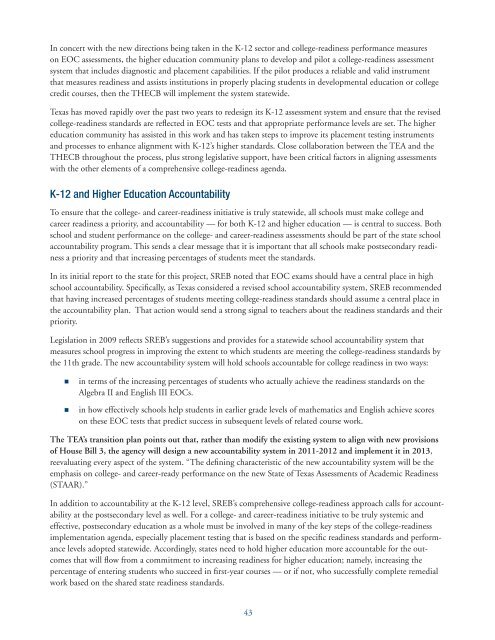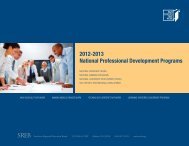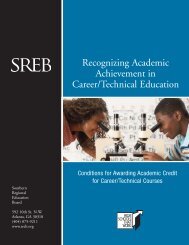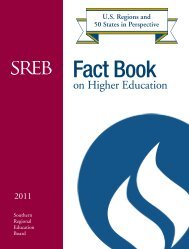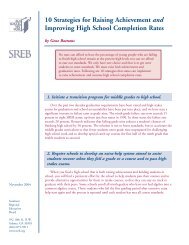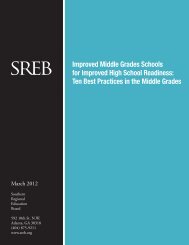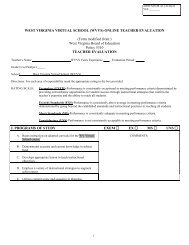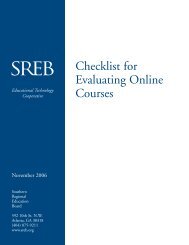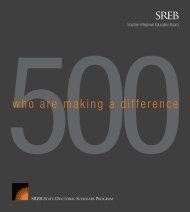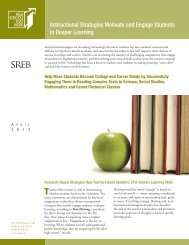Final Progress Reports - Southern Regional Education Board
Final Progress Reports - Southern Regional Education Board
Final Progress Reports - Southern Regional Education Board
Create successful ePaper yourself
Turn your PDF publications into a flip-book with our unique Google optimized e-Paper software.
In concert with the new directions being taken in the K-12 sector and college-readiness performance measures<br />
on EOC assessments, the higher education community plans to develop and pilot a college-readiness assessment<br />
system that includes diagnostic and placement capabilities. If the pilot produces a reliable and valid instrument<br />
that measures readiness and assists institutions in properly placing students in developmental education or college<br />
credit courses, then the THECB will implement the system statewide.<br />
Texas has moved rapidly over the past two years to redesign its K-12 assessment system and ensure that the revised<br />
college-readiness standards are reflected in EOC tests and that appropriate performance levels are set. The higher<br />
education community has assisted in this work and has taken steps to improve its placement testing instruments<br />
and processes to enhance alignment with K-12’s higher standards. Close collaboration between the TEA and the<br />
THECB throughout the process, plus strong legislative support, have been critical factors in aligning assessments<br />
with the other elements of a comprehensive college-readiness agenda.<br />
K-12 and Higher <strong>Education</strong> Accountability<br />
To ensure that the college- and career-readiness initiative is truly statewide, all schools must make college and<br />
career readiness a priority, and accountability — for both K-12 and higher education — is central to success. Both<br />
school and student performance on the college- and career-readiness assessments should be part of the state school<br />
accountability program. This sends a clear message that it is important that all schools make postsecondary readiness<br />
a priority and that increasing percentages of students meet the standards.<br />
In its initial report to the state for this project, SREB noted that EOC exams should have a central place in high<br />
school accountability. Specifically, as Texas considered a revised school accountability system, SREB recommended<br />
that having increased percentages of students meeting college-readiness standards should assume a central place in<br />
the accountability plan. That action would send a strong signal to teachers about the readiness standards and their<br />
priority.<br />
Legislation in 2009 reflects SREB’s suggestions and provides for a statewide school accountability system that<br />
measures school progress in improving the extent to which students are meeting the college-readiness standards by<br />
the 11th grade. The new accountability system will hold schools accountable for college readiness in two ways:<br />
in terms of the increasing percentages of students who actually achieve the readiness standards on the<br />
Algebra II and English III EOCs.<br />
in how effectively schools help students in earlier grade levels of mathematics and English achieve scores<br />
on these EOC tests that predict success in subsequent levels of related course work.<br />
The TEA’s transition plan points out that, rather than modify the existing system to align with new provisions<br />
of House Bill 3, the agency will design a new accountability system in 2011-2012 and implement it in 2013,<br />
reevaluating every aspect of the system. “The defining characteristic of the new accountability system will be the<br />
emphasis on college- and career-ready performance on the new State of Texas Assessments of Academic Readiness<br />
(STAAR).”<br />
In addition to accountability at the K-12 level, SREB’s comprehensive college-readiness approach calls for accountability<br />
at the postsecondary level as well. For a college- and career-readiness initiative to be truly systemic and<br />
effective, postsecondary education as a whole must be involved in many of the key steps of the college-readiness<br />
implementation agenda, especially placement testing that is based on the specific readiness standards and performance<br />
levels adopted statewide. Accordingly, states need to hold higher education more accountable for the outcomes<br />
that will flow from a commitment to increasing readiness for higher education; namely, increasing the<br />
percentage of entering students who succeed in first-year courses — or if not, who successfully complete remedial<br />
work based on the shared state readiness standards.<br />
43


